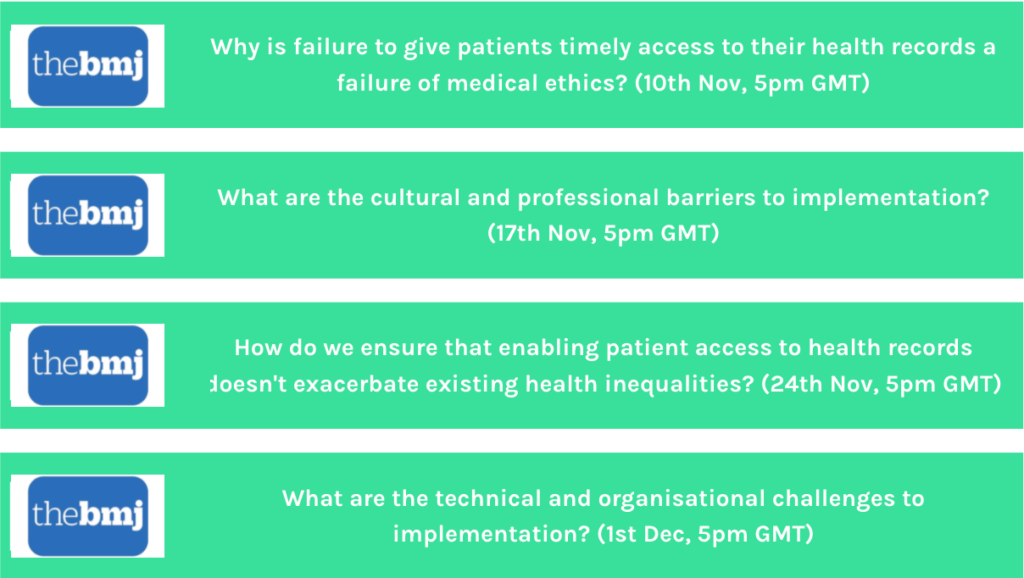
The BMJ (formerly the British Medical Journal) continues to lead the world in patient & public partnership with clinicians, including more coverage of patient empowerment topics than anyone else I know in medical publishing. Some of the issues are unique to Britain but many are global cultural issues – not least being the balance of power between clinicians and the patients they serve.
Now that electronic medical records have been installed in much of the developed world, an issue keeps coming up that we here on this blog care deeply about (that’s you, dear reader) – getting us the access we need and deserve to all that data in their computers. To examine the issues, both philosophical and pragmatic, the BMJ has announced what I hope will be a great series of webinars. The following is adapted from their announcement.
Registration is free. Each is on a Wednesday at noon ET, 9 am PT.
BMJ Webinar series: Public access to medical records – why is progress so slow?
Medical notes have traditionally been ‘owned’ by their authors – clinicians – with access granted to patients as an afterthought. But there is growing momentum behind the idea that medical notes should, by default, be made available, in real time, to patients and their carers. After all, we can access our banking records, Internet histories and other data about us in real time. Why not our medical records?
Despite advances in technology, digital literacy, and favourable changes in legislation, progress towards making medical records easily available has been, with a few notable exceptions, glacially slow.
The BMJ has long believed that all patients should have easy, real-time access to their medical records and notes. In this series of webinars, hosted by the BMJ Patient Editor team, a powerful line-up of international experts will explore the underlying reasons for this slow progress from a variety of angles. In doing so, we aim to stimulate debate, discussion – and hopefully, action.
November 10: The ethics of patient access
The first webinar will explore the issue from an ethical standpoint, and discuss frequent objections such as patient harm, loss of trust and diminished autonomy. Registration
November 17: Professional and cultural barriers
The second webinar will consider the ‘hearts and minds’ issues, from both the clinical and public perspectives. What are the key misconceptions? What training/assistance needs to be made available to medical professionals and members of the public to improve access? Registration
November 24: Widening health inequalities
In the third webinar, the focus will be on equality and equity of access – both within different communities, and between nations. How should this be implemented so as to ensure existing disparities are not widened. Registration
December 1: Bureaucratic barriers and governance issues
In the fourth and final webinar of this series on patient access to health records we will explore the issue from a practical standpoint, including GDPR challenges [the “European HIPAA” privacy rule], concerns around sharing of records between countries, proxy access to health records and how to influence organisations to implement patient access to health records. How can progress be hastened in complex healthcare systems with many moving parts? Registration


Leave a Reply